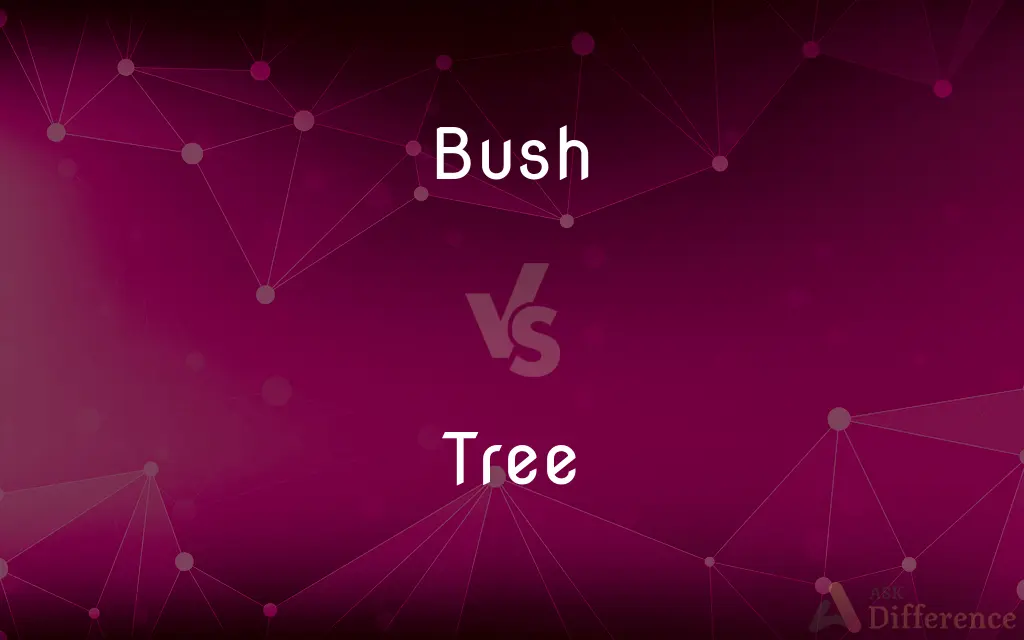Bush vs. Tree — What's the Difference?
By Fiza Rafique & Maham Liaqat — Updated on March 8, 2024
A bush is typically a smaller, denser plant with multiple stems, while a tree is taller, with a single trunk.

Difference Between Bush and Tree
Table of Contents
ADVERTISEMENT
Key Differences
A bush, often characterized by its shorter height and multiple stems branching from the base, is designed to occupy the lower tier of the forest canopy. Whereas a tree typically towers over with a single dominant trunk, extending into branches at some height above the ground, establishing itself in the upper canopy.
Bushes usually exhibit a more rounded and dense foliage, providing thick cover and habitat close to the ground. On the other hand, trees offer a canopy that shades the ground below and creates a distinct ecosystem both at its base and within its higher branches.
The growth rate of bushes is generally faster, reaching their full size in a shorter period, which makes them ideal for landscaping and garden borders. Trees, however, grow more slowly but can live for hundreds or even thousands of years, contributing significantly to their ecosystem over a long period.
Bushes are often chosen for their ornamental value or for creating natural barriers, due to their dense foliage and relatively easy maintenance. Trees are valued not only for their aesthetic appeal but also for their ability to provide shade, fruit, and sometimes timber.
In terms of root systems, bushes typically have shallower and more spread out roots that occupy the upper layers of the soil. Trees have deeper root systems that can anchor the tall structure securely and access deeper water sources.
ADVERTISEMENT
Comparison Chart
Height
Generally under 6 meters (20 feet)
Typically over 6 meters (20 feet)
Structure
Multiple stems branching from the base
Single trunk with branches higher up
Growth Rate
Usually faster, reaching full size sooner
Slower but can live much longer
Foliage
Dense and close to the ground, often rounded
Canopy that provides shade and habitats
Root System
Shallower, spread out
Deeper, can reach underground water sources
Compare with Definitions
Bush
A low, densely branched plant.
The garden was bordered with flowering bushes.
Tree
A tall perennial plant with a single woody trunk.
The oak tree in our backyard is over 100 years old.
Bush
A wild or uncultivated variety.
Berry pickers found the best fruit in the bushes.
Tree
Provides shade and shelter.
We enjoyed our picnic in the cool shade of a large tree.
Bush
Used in landscaping for hedges.
We planted a row of bushes for privacy.
Tree
A vital part of the ecosystem.
Trees are essential for producing oxygen and supporting wildlife.
Bush
Attracts various wildlife.
Birds often nest in the dense foliage of bushes.
Tree
Used for timber and paper products.
The forest was managed sustainably to supply trees for lumber.
Bush
Can regenerate quickly if damaged.
After the fire, the bushes in the area began to sprout anew.
Tree
Can produce fruit or nuts.
The apple tree finally bore fruit this year.
Bush
A shrub or clump of shrubs with stems of moderate length
A rose bush
Tree
In botany, a tree is a perennial plant with an elongated stem, or trunk, supporting branches and leaves in most species. In some usages, the definition of a tree may be narrower, including only wood plants with secondary growth, plants that are usable as lumber or plants above a specified height.
Bush
(especially in Australia and Africa) wild or uncultivated country
They have to spend a night camping in the bush
Tree
A woody perennial plant, typically having a single stem or trunk growing to a considerable height and bearing lateral branches at some distance from the ground.
Bush
A luxuriant growth of thick hair or fur
A childish face with a bush of bright hair
Tree
A wooden structure or part of a structure.
Bush
A metal lining for a round hole, especially one in which an axle revolves.
Tree
A thing that has a branching structure resembling that of a tree.
Bush
A sleeve that protects an electric cable where it passes through a panel.
Tree
Force (a hunted animal) to take refuge in a tree.
Bush
Spread out into a thick clump
Her hair bushed out like a halo
Tree
(of an area) planted with trees
Sparsely treed grasslands
Bush
A low shrub with many branches.
Tree
A perennial woody plant having a main trunk and usually a distinct crown.
Bush
A thick growth of shrubs; a thicket.
Tree
An herbaceous plant or shrub resembling a tree in form or size.
Bush
Land covered with dense vegetation or undergrowth.
Tree
Something that resembles a tree in form, especially a diagram or arrangement that has branches showing relationships of hierarchy or lineage.
Bush
Land remote from settlement
The Australian bush.
Tree
(Computers) A structure for organizing or classifying data in which every item can be traced to a single origin through a unique path.
Bush
A shaggy mass, as of hair.
Tree
A wooden beam, post, stake, or bar used as part of a framework or structure.
Bush
Vulgar Slang A growth of pubic hair.
Tree
A saddletree.
Bush
A fox's tail.
Tree
A gallows.
Bush
(Archaic) A clump of ivy hung outside a tavern to indicate the availability of wine inside.
Tree
The cross on which Jesus was crucified.
Bush
(Obsolete) A tavern.
Tree
To force up a tree
Dogs treed the raccoon.
Bush
To grow or branch out like a bush.
Tree
(Informal) To force into a difficult position; corner
The reporters finally treed the mayor.
Bush
To extend in a bushy growth.
Tree
To supply or cover with trees
A hillside that is treed with oaks.
Bush
To decorate, protect, or support with bushes.
Tree
A perennial woody plant, not exactly defined, but differentiated from a shrub by its larger size (typically over a few meters in height) or growth habit, usually having a single (or few) main axis or trunk unbranched for some distance above the ground and a head of branches and foliage.
Hyperion is the tallest living tree in the world.
Birds have a nest in a tree in the garden.
Bush
To furnish or line with a bushing.
Tree
Any plant that is reminiscent of the above but not classified as a tree (in any botanical sense).
The banana tree
Bush
(Slang) Bush-league; second-rate
"Reviewers here have tended to see in him a kind of bush D.H. Lawrence" (Saturday Review).
Tree
An object made from a tree trunk and having multiple hooks or storage platforms.
He had the choice of buying a scratching post or a cat tree.
Bush
(horticulture) A woody plant distinguished from a tree by its multiple stems and lower height, being usually less than six metres tall; a horticultural rather than strictly botanical category.
Tree
A device used to hold or stretch a shoe open.
Bush
A shrub cut off, or a shrublike branch of a tree.
Bushes to support pea vines
Tree
The structural frame of a saddle.
Bush
(historical) A shrub or branch, properly, a branch of ivy (sacred to Bacchus), hung out at vintners' doors, or as a tavern sign; hence, a tavern sign, and symbolically, the tavern itself.
Tree
(graph theory) A connected graph with no cycles or, if the graph is finite, equivalently a connected graph with n vertices and n−1 edges.
Bush
A person's pubic hair, especially a woman's.
Tree
(computing theory) A recursive data structure in which each node has zero or more nodes as children.
Bush
(hunting) The tail, or brush, of a fox.
Tree
(graphical user interface) A display or listing of entries or elements such that there are primary and secondary entries shown, usually linked by drawn lines or by indenting to the right.
We’ll show it as a tree list.
Bush
(archaic) A tavern or wine merchant.
Tree
Any structure or construct having branches representing divergence or possible choices.
Family tree; skill tree
Bush
(often with "the") Tracts of land covered in natural vegetation that are largely undeveloped and uncultivated.
Tree
The structure or wooden frame used in the construction of a saddle used in horse riding.
Bush
(Australia) The countryside area of Australia that is less arid and less remote than the outback; loosely, areas of natural flora even within conurbations.
Tree
Marijuana.
Bush
(New Zealand) An area of New Zealand covered in forest, especially native forest.
Tree
(obsolete) A cross or gallows.
Tyburn tree
Bush
(Canadian) The wild forested areas of Canada; upcountry.
Tree
(chemistry) A mass of crystals, aggregated in arborescent forms, obtained by precipitation of a metal from solution.
Bush
(Canadian) A woodlot or bluff on a farm.
Tree
(cartomancy) The fifth Lenormand card.
Bush
(baseball) Amateurish behavior, short for "bush league behavior"
Tree
(transitive) To chase (an animal or person) up a tree.
The dog treed the cat.
Bush
A thick washer or hollow cylinder of metal.
Tree
(transitive) To place in a tree.
Black bears can tree their cubs for protection, but grizzly bears cannot.
Bush
A mechanical attachment, usually a metallic socket with a screw thread, such as the mechanism by which a camera is attached to a tripod stand.
Tree
(transitive) To place upon a tree; to fit with a tree; to stretch upon a tree.
To tree a boot
Bush
A piece of copper, screwed into a gun, through which the venthole is bored.
Tree
(intransitive) To take refuge in a tree.
Bush
(intransitive) To branch thickly in the manner of a bush.
Tree
Any perennial woody plant of considerable size (usually over twenty feet high) and growing with a single trunk.
Bush
To set bushes for; to support with bushes.
To bush peas
Tree
Something constructed in the form of, or considered as resembling, a tree, consisting of a stem, or stock, and branches; as, a genealogical tree.
Bush
To use a bush harrow on (land), for covering seeds sown; to harrow with a bush.
To bush a piece of land; to bush seeds into the ground
Tree
A piece of timber, or something commonly made of timber; - used in composition, as in axletree, boottree, chesstree, crosstree, whiffletree, and the like.
Bush
To become bushy (often used with up).
I can tell when my cat is upset because he'll bush up his tail.
Tree
A cross or gallows; as Tyburn tree.
[Jesus] whom they slew and hanged on a tree.
Bush
(transitive) To furnish with a bush or lining; to line.
To bush a pivot hole
Tree
Wood; timber.
In a great house ben not only vessels of gold and of silver but also of tree and of earth.
Bush
(Australia) Towards the direction of the outback.
On hatching, the chicks scramble to the surface and head bush on their own.
Tree
A mass of crystals, aggregated in arborescent forms, obtained by precipitation of a metal from solution. See Lead tree, under Lead.
Bush
(colloquial) Not skilled; not professional; not major league.
They're supposed to be a major league team, but so far they've been bush.
Tree
To drive to a tree; to cause to ascend a tree; as, a dog trees a squirrel.
Bush
A thicket, or place abounding in trees or shrubs; a wild forest.
Tree
A tall perennial woody plant having a main trunk and branches forming a distinct elevated crown; includes both gymnosperms and angiosperms
Bush
A shrub; esp., a shrub with branches rising from or near the root; a thick shrub or a cluster of shrubs.
To bind a bush of thorns among sweet-smelling flowers.
Tree
A figure that branches from a single root;
Genealogical tree
Bush
A shrub cut off, or a shrublike branch of a tree; as, bushes to support pea vines.
Tree
English actor and theatrical producer noted for his lavish productions of Shakespeare (1853-1917)
Bush
A shrub or branch, properly, a branch of ivy (as sacred to Bacchus), hung out at vintners' doors, or as a tavern sign; hence, a tavern sign, and symbolically, the tavern itself.
If it be true that good wine needs no bush, 't is true that a good play needs no epilogue.
Tree
Chase a bear up a tree with dogs and kill it
Bush
The tail, or brush, of a fox.
Bush
A lining for a hole to make it smaller; a thimble or ring of metal or wood inserted in a plate or other part of machinery to receive the wear of a pivot or arbor.
Bush
A piece of copper, screwed into a gun, through which the venthole is bored.
Bush
To branch thickly in the manner of a bush.
Bush
To set bushes for; to support with bushes; as, to bush peas.
Bush
To use a bush harrow on (land), for covering seeds sown; to harrow with a bush; as, to bush a piece of land; to bush seeds into the ground.
Bush
To furnish with a bush, or lining; as, to bush a pivot hole.
Bush
A low woody perennial plant usually having several major branches
Bush
A large wilderness area
Bush
Dense vegetation consisting of stunted trees or bushes
Bush
43rd President of the United States; son of George Herbert Walker Bush (born in 1946)
Bush
United States electrical engineer who designed an early analogue computer and who led the scientific program of the United States during World War II (1890-1974)
Bush
Vice President under Reagan and 41st President of the United States (born in 1924)
Bush
Hair growing in the pubic area
Bush
Provide with a bushing
Bush
Not of the highest quality or sophistication
Common Curiosities
How tall can a tree grow?
Trees can grow to be over 100 meters tall, depending on the species.
What defines a bush?
A bush is defined by its short stature, dense branching from the base, and often rounded shape.
Why are trees important to the environment?
Trees provide oxygen, improve air quality, conserve water, and support wildlife.
Can bushes bear fruit?
Yes, some bushes like blueberry bushes can bear fruit.
Can trees live longer than bushes?
Yes, trees often have much longer lifespans than bushes.
Do all trees lose their leaves in the fall?
Deciduous trees lose their leaves in fall, but evergreen trees retain them year-round.
How do bushes and trees differ in root systems?
Bushes have shallower, more spread-out roots, while trees have deeper root systems.
Are bushes easier to maintain than trees?
Generally, bushes require less maintenance due to their size and faster growth rate.
What role do tree roots play in the ecosystem?
Tree roots help stabilize soil, prevent erosion, and can access deep water sources.
Are all trees single-trunked?
Most trees have a single trunk, but some species can develop multiple trunks.
Can bushes provide privacy?
Yes, densely planted bushes are often used as privacy hedges.
Can bushes be used in erosion control?
Yes, the root systems of bushes can help stabilize soil and control erosion.
How does the lifespan of trees affect their ecosystem role?
The long lifespan of trees allows them to provide consistent benefits like carbon storage, habitat, and soil enrichment over time.
How do bushes contribute to biodiversity?
Bushes provide food, shelter, and nesting sites for various species, enhancing biodiversity.
What is the significance of a tree's canopy?
A tree's canopy provides shade, habitat, and can influence the microclimate below it.
Share Your Discovery

Previous Comparison
Valid vs. Available
Next Comparison
Ghost vs. SoulAuthor Spotlight
Written by
Fiza RafiqueFiza Rafique is a skilled content writer at AskDifference.com, where she meticulously refines and enhances written pieces. Drawing from her vast editorial expertise, Fiza ensures clarity, accuracy, and precision in every article. Passionate about language, she continually seeks to elevate the quality of content for readers worldwide.
Co-written by
Maham Liaqat













































